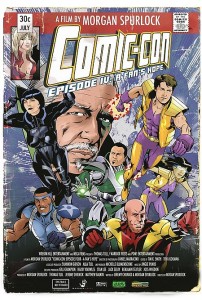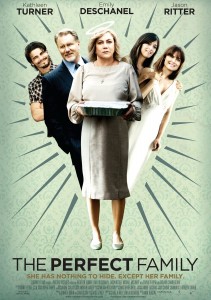
Comic-Con Episode IV: A Fan’s Hope

Plot: Morgan Spurlock takes an inside look at the proceedings of a Comic-Con convention. Highlighted people are the comic sellers, the artists trying to break into the business, the masqueraders, the diehard fans, the collectors, the lovers and interviews with celebrities and those working in the comic industry.
Review: “Comic-Con Episode IV: A Fan’s Hope” feels like a pilot for a television show. I wouldn’t be surprised to discover if it were, since a slew of television pilots ran for an hour and a half. Most pilots also test the grounds for what will and won’t work in the show. Morgan Spurlock dips his toes into all faucets of Comic-Con, but never fully immerses himself into one. Each tidbit of history and examinations on guests is kept brief.
This is a good direction to take the documentary, that way everybody get’s their time in the spotlight. It prevents the film from ever fully taking off and delivering all of the information the viewer may want. To be fair, that’s almost an impossibility (unless the film ran for a protracted running time). Hence why this film feels like a pilot for an eventual television show. That’s the only way for a documentary of Comic-Con to come full circle.
This feeling like a television pilot isn’t particularly a bad thing. It’s quite fun and engaging, actually. It’s easy to get sucked into the frenzy and mayhem that is Comic-Con. The people we follow around are all interesting and are bound to connect with someone (whether it be through comparison or fascination). I myself got suckered into the couple who met at Comic-Con and the boyfriend is set to propose at a Kevin Smith Q&A. You know how it’s going to turn out, but can’t help but get engaged (no pun intended) into the build. Kevin Smith helps make the payoff with his charm and kindness.
Morgan Spurlock surprisingly stays behind the camera, a first (I believe) in any of his documentaries. Though I respect him for doing so to give the fans their time in the sun, I do wish he would have popped up at least once or twice. His boisterous demeanor would have fit in perfectly and gave the documentary a little oomph. It’s easy to forget he’s the one behind the camera, as nothing special is remotely done (though that is how documentaries should be filmed).
If the goal of “Comic-Con Episode IV: A Fan’s Hope” is to trigger a television series, then it worked perfectly! It whet my appetite and left me salivating for more. If, however, it was a one-shot deal, then it was a fun, if not wholly satisfying, experience. We only get glimpses of the history and behind the scenes aspect of the convention and there’s obviously dozens of stories not yet explored. You can’t truly slight the film for that, but you hope this wasn’t just it. You leave with a smile on your face wanting more.
Final Rating: B
The Art of Getting By

Plot: George Zinavoy (Freddie Highmore) is a senior who’s gotten by without doing much work. Just as his flaccid lifestyle is about to catch up with him, he befriends Sally Howe (Emma Roberts). She gives him a dose of reality and messes with heart, complicating his already hectic life.
Review: Your enjoyment of “The Art of Getting By” hinders on your connection to George Zinavoy. If you’ve ever had your heart broken and/or struggled with school and direction, you’ll be sucked into the story much easier than those who haven’t. There’s a market out there for this crowd, one in which I’m apart of (I too have struggled with both school and love). They may have already ventured into this territory (such as with the superior “Submarine”), but going with the motions again isn’t a bad option.
The film relies heavily on the strength of Freddie Highmore and Emma Roberts’ performances. Though both can be a bit flaky at times, I felt they pulled it off. Highmore moreso than Roberts, as she’s gotten comfortable with the pretty girl role. She’s essentially replaying Noelle from “It’s Kind of a Funny Story”, except with a more bitchy attitude to her (maybe more like Grace from “Valentine’s Day”). It works with the character, so I’m not complaining (too much). Freddie has more breathing room to develop his character, as most only remember him as Charlie Bucket from “Charlie and the Chocolate Factory”.
Other characters and dilemmas are sprinkled in throughout, though they’re all staples of the genre. George’s behavior is causing tension with his mother, Vivian (Rita Wilson) and her husband, Jack (Sam Robards), who are going through their own turmoil. He’s also drawing the ire of his teachers (one played by Alicia Silverstone) and his principal (Blair Underwood), who all know he can succeed if he puts his mind to it.
Sally has her own demons. Her mother. Charlotte (Elizabeth Reaser), is recently divorced and going wild with her newfound freedom. The little snippets she has reveals why Sally is the way she is. It also explains her choice of friends and why she enjoys toying with George. She creates her own demon when an artist named Dustin (Michael Angarano) becomes a mentor of sorts to George and she predictably falls for him.
If you’ve seen this story before, it’s easy to telegraph what’s going to happen. It’s not entirely predictable, but it’s easy to figure out. It’s a good starting point for those new to the subgenre, but will only succeed in wasting time for those that are familiar with it. That’s not to say it’s not worth their time. I’ve seen this story multiple times and I found myself enjoying this (even though it succumbs to the Hollywood feel-good syndrome). I just don’t want to promise anything new to anybody.
Final Rating: B
The Perfect Family

Plot: Eileen Cleary (Kathleen Turner) is a devout Catholic who is up for the Catholic Woman of the Year at her church. Standing in her way is Agnes Dunn (Sharon Lawrence), a woman who has the perfect family. Eileen’s family, on the other hand, is far from that. Her husband, Frank (Michael McGrady) is a former alcoholic; her son, Frank Jr. (Jason Ritter) is getting a divorce from his wife of two children and fooling around with a manicurist; and her daughter, Shannon (Emily Deschanel) is a lesbian engaged to Angela Rayes (Angelique Cabral) and is five months pregnant with their child. In order to secure her victory, she must lie about her family.
Review: Why would someone make a parody of religion without an edge? Why lampoon Catholics without having a bite in the humor? Why make cheap potshots, only to turn around and praise the target? Why play it safe when you could be more successful by going over the top? These questions ran through my head during my viewing of “The Perfect Family”.
My guess is that Anne Renton wanted to have her cake and eat it too. I assume she was raised Catholic and wants her mother to see this film. Therefore, she plays it safe and only makes quick (and sometimes witty and insightful) remarks about Catholicism. She pulls back when it comes to the heavy material and douses it with saccharine. That way, nobody can get offended. That or the script, written by Paula Goldberg and Claire V. Riley, was written this way and she’s simply adapting it to film. Whatever the case may be, the film’s direction needed a serious overhaul.
Kathleen Turner gives it her all as the devout patriarch of the Cleary family. It’s sad that the script didn’t give her a lot more to work with than light humor and “touching” drama. Her performance would have fit in perfectly with a more serious and harder satire of religion. Her performance still works here, but her revelations throughout the film feel forced.
The rest of the cast is decent, I suppose. Emily Deschanel shows signs of breaking through in heart to heart conversations with her mother, but she’s directed to only act pretty the rest of the time. Both Jason Ritter and Michael McGrady don’t have much to work with, but do their best. Sharon Lawrence has the witchy attitude down as Eileen’s adversary, but her arch is underdeveloped.
Speaking of underdeveloped, the comedy needed touching up. There are bright spots where the humor works and I felt the film was going to pick up. Two lines in particular had me cackling (“Why would a nun be a marriage expert?” and “I don’t have to think, I’m a Catholic.”), as well as one regarding Shannon’s sexuality (don’t worry, it’s not offensive). These take a backseat to fluffy drama and feel good moments that fall flat on their faces.
If Anne Renton wanted to make a drama revolving around a struggling Catholic family, that’s fine. The problem is the film masquerades as a comedy, one that challenges religion. Except she wants to play it safe and not offend anybody. Chances are Catholics are still going to be offended. If she went full circle, she would have ostracized them, but gained a crowd looking for a satire of Catholicism. By playing it safe, she offended them too by giving them a trite drama that belongs on Lifetime.
Final Rating: C
Punished

Plot: When his daughter is murdered by greedy abductors, Wong Ho-chiu (Anthony Wong Chau-Sang) will do anything to avenger her and keep the situation under wraps. He enlists one of his workers, Chor (Richie Ren), to hunt down and eliminate her abductors. He too is struggling with issues with his son, which motivates him to perform his task.
Review: “Punished” isn’t your average revenge thriller. The actual revenge aspect doesn’t officially start until the halfway point. Even then, Wing-cheong Law wisely downplays it. There’s still enough here to quench the thirst of thrill seekers (one sequence involving a sledgehammer made me cringe), but that’s not the film’s main prerogative. It’s more of a character study of those involved in such a dramatic incident.
Anthony Wong Chau-Sang gives a stellar performance as Wong, the strict father living with regret after his daughter’s death. He blames himself for her downward spiral into drugs, as well as not being able to save her in time. The first half of the film is told in flashbacks (we start off with him discovering her body), where we see the strained relationship between the two. He also has a son that he forces his beliefs upon, though he’s largely an afterthought.
I’m usually against films that are told in flashback narrative, especially ones such as this where it’s heavily utilized. This time around, I felt it had to be done this way. Telling the story straightforward would diminish the impact. Since the key to the film is Wong’s plight of despair, having the film constantly jerk between the past and the present (though I should add it’s neatly edited) parallels how he is feeling. The events of the past keep playing through his head like a slideshow when coping with his depression.
When the revenge aspect picks up, the film starts to lose it’s impact. Law does his best to adhere to this, hence why he gave Chor the troubled son backstory. That way he can relate to Wong’s situation and give him, and the viewers, more of a reason to exact revenge. He also limits how much action is shown, only a few foot chases and shoot outs taking up screen time. Even so, I felt they could have been exterminated completely, as they did nothing but draw away from the drama. I feel they backed themselves into a corner by placing this in the revenge subgenre.
Law does his best to elevate the material and does an honorable job. He pulls two knockout performances out of Wong and Ren, giving the film the emotional pull it needed! The crisp usage of flashbacks enhances the story, as opposed to detracting from it. The revenge sequences may hinder the film, but they’re still done well and serve their purpose. “Punished” isn’t the most striking entry into the revenge subgenre, but it’s an above average outing.
Final Rating: B
Michael

Plot: Michael (Michael Fuith) seems like an average man. He has a good job and is well liked by his family and peers. What they don’t know is he has locked Wolfgang (David Rauchenberger), a ten year old boy, locked inside of his basement.
Review: “Michael” belongs in the same class that both “Tyrannosaur” and “The Snowtown Murders” reside in. That being an unsettling film that is excellent in almost every conceivable way! I’d relate this more to “The Snowtown Murders”, as the topics are closer to one another. “The Snowtown Murders” dealt with a psychopath forcing himself and his lifestyle onto teenagers. “Michael” deals with a pedophile holding a young child captive.
Markus Schleinzer doesn’t plan on making anybody happy with “Michael”. It’s a bleak film from start to finish. You’ll never feel comfortable watching it, which is precisely how the experience should be. Schleinzer intends for you to feel depression and dread. One need not to worry about seeing Michael actually having his way with Wolfgang. There’s build to the act, but Markus cuts away right as it’s about to start. He knows the audience doesn’t need to see the act to know it’s disgusting and unnerving. Simply showing the build and the aftermath (Michael cleaning himself) up will do the trick.
Making matters even more disheartening is having Michael take Wolfgang on trips. A day at the park and petting zoo doesn’t sound like it’d be chilling, but it is when you watch Wolfgang’s reactions. You see a glimmer of joy in his eyes as he’s playing with the animals, only for that to be erased when he peers over at his captor. Walking through the park and seeing children with their parents clearly breaks his heart, and ours, as he knows he doesn’t have that anymore. He can’t simply scream out to them for help, out of fear of what Michael would do to him if his plan didn’t pan out.
Markus also takes a detour of sorts from the main storyline to wisely develop Michael as an average man. Not only do we get peeks into his pretty successful career (he’s up for a lucrative promotion), we also briefly see his relationship with his family. One must wonder what his sister would think if she found out her brother, who is getting his nephew a gift, is actually a pedophile. The same goes for Michael’s friends, who accompany him on a ski trip. Most people will find this scene to be worthless, as it shows nothing more than Michael having fun. That is the essence of the scene, as Schleinzer is driving home the fact that this man is living a nifty life while Wolfgang suffers alone in his basement. Just thinking about that kid being trapped down there alone for days is disheartening.
I can’t recommend “Michael” to those who want to see an enjoyable film. I know that’s a huge chunk of the film going demographic, so this review will be useless to them. I can only recommend this film to those who want to be challenged by films. To have their nerves put in a vise lock for ninety six minutes. To those who won’t necessarily enjoy the experience, but appreciate it as the brilliant filmmaking it is!
Final Rating: A
